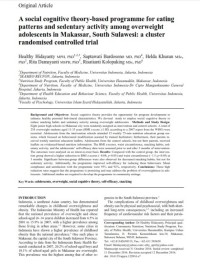A social cognitive theory-based programme for eating patterns and sedentary activity among overweight adolescents in Makassar, South Sulawesi : a cluster randomised controlled trial

Author
Healthy Hidayanty - Personal NameSaptawati Bardosono - Personal Name
helda - Personal Name
Rita Damayanti - Personal Name
Risatianti Kolopaking - Personal Name
Abstract
Background and objectives: Social cognitive theory provides the opportunity for program development to enhance healthy personal behvioural characteristics. We devised study to employ social cognitive theory to reduce snacking habits and sedentary activity among overweight adolescents .
Methods and study design: Eight junior high schools in Makassar city were randomly assigned as intervention and control schools. A total of 238 overweight students aged 11-15 years (BMI z-score >=1 SD, according to a 2007 report from the WHO) were recruited. Adolescents from the intervention schools attended 12 weekly 75-min nutrition education group sessions, which focused on behavioural modification assisted by trained facilitators; furthermore, their parents received weekly nutrition education leaflets. Adolescents from the control schools, but not their parents, received leaflets on evidenced-based nutrition information. The BMI z-scores, waist circumference, snacking habits, sedentary activity, and the adolescents' self-efficacy data were assessed prior to and after 3 months of intervention. The outcomes were analysed on an intent-to-treat basis.
Results: Compared with the control group, the intervention group showed a higher reduction in BMI z-scores (-0.08; p less 0.05) and waist circumference (-1.5; p less 0.05) at 3 months. Significant between-group differences were also observed for decreased snacking habits, but not for sedentary activity. Additionally, the programme improved self-efficacy for reducing these behaviours. Mean compliance and satisfaction with the programme were 95% and 92%, respectively.
Conclusions: These high reduction rates suggest that the programme is promising and may address the problem of overweightness in adolescents. Additional studies are required to develop the programme in community settings.
Detail Information
| Series Title | : | - |
| Call Number | : | - |
| Publisher | : | : Asia Pac J Clin Nutr., 2016 |
| Collation | : | Asia Pac J Clin Nutr . 2016 Dec;25(Suppl 1):S83-S92. |
| Language | : | English |
| ISBN/ISSN | : | - |
| Classification | : | NONE |
 Computer Science, Information & General Works
Computer Science, Information & General Works  Philosophy & Psychology
Philosophy & Psychology  Religion
Religion  Social Sciences
Social Sciences  Language
Language  Pure Science
Pure Science  Applied Sciences
Applied Sciences  Art & Recreation
Art & Recreation  Literature
Literature  History & Geography
History & Geography